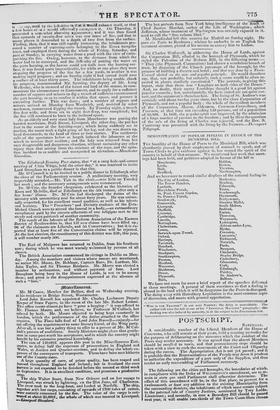Sir Charles Wetherell, in addressing the House of Lords, against
the Corporation Bill, alluded to the borough of Plymouth, which he styled the Palestine of the Reform Bill, in the following terms :- " They (the Plymouth Corporation) had shown a scandalousbreaeh of trust, by disposing of the Church patronage of the borough, for the purpose of building a theatre and hotel ; and that was done by a Town- Council elected on the new and popular principle. He would therefore say, that, not probably, but certainly, such a scene would be often re- peated in places similarly constituted." The journals, in giving this report, state that there was " Laughter on both sides of the House." And, no doubt, their merry Lordships thought it a good hit against popular councils ; but, unfortunately, the facts stated arc not quite cor- rect, and the argument is therefore lost. The living of St. Andrew's was certainly sold about twelve years since, but by the close Corporation of Plymouth, and not a popular body ; the whole of the resident members of the Corporation, Mayor, Aldermen, Common-Councilmen, and Freemen, at that time not exceeding 150 persons, out of a population of 30,000. In 1831, the popular spirit was improved, by the admission of a large number of persons to the freedom ; and by them the question of the sale of the living of Charles was rejected, and the Rev. S. Courtenay was presented with the living by the freemen.—Deronport Telegraph.


























 Previous page
Previous page